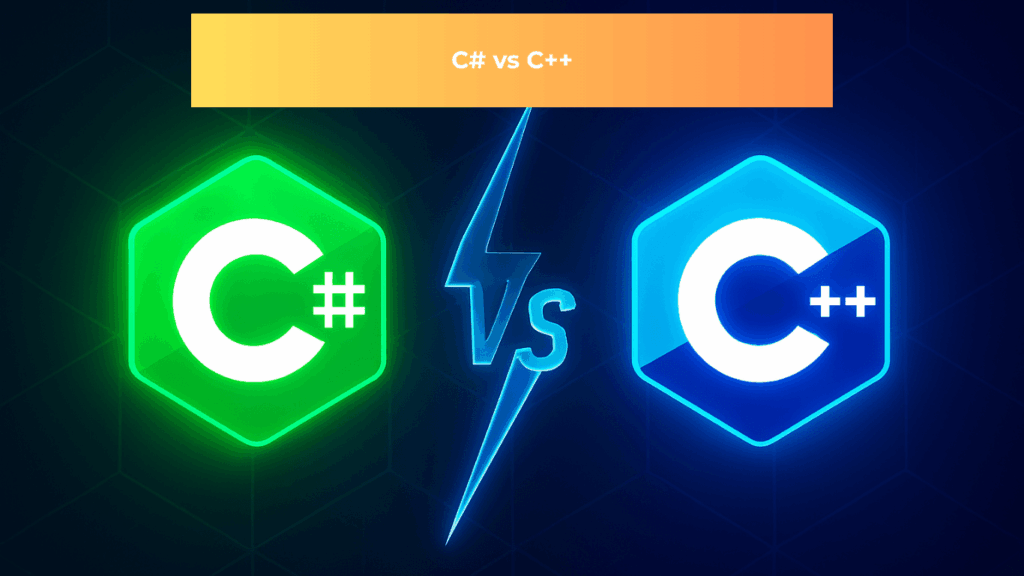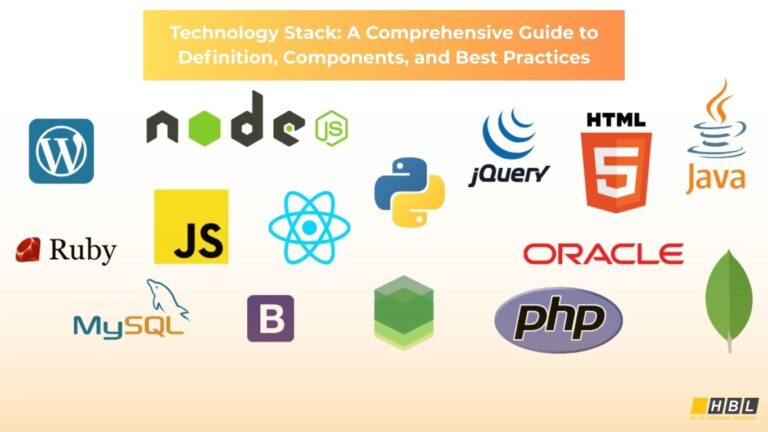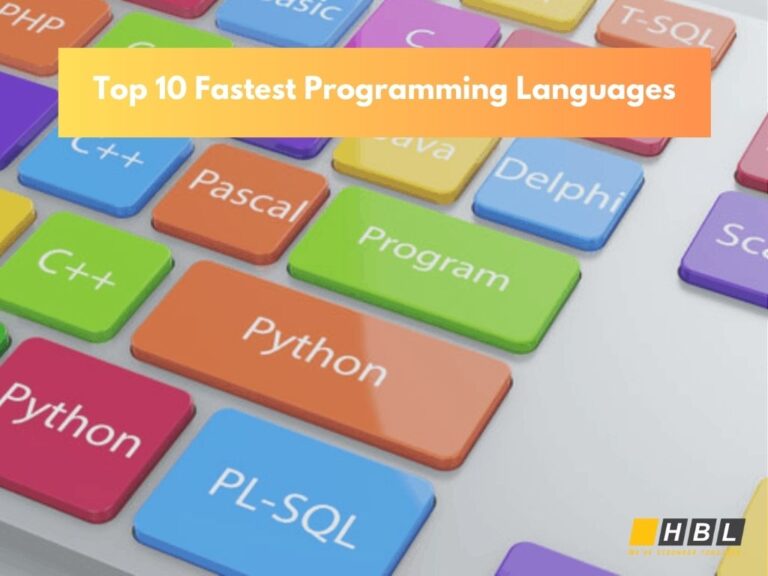C# vs C++ — understand the difference between C++ and C#, performance trade-offs, use cases, and a practical VS Code guide to running C# so you can pick the right stack for your next product.
Introduction — why the C# vs C++ choice matters
Choosing the right language for a project is more than a technical preference — it affects speed of delivery, total cost of ownership, maintenance risk, and long-term product flexibility. C# vs C++ is a classic comparison: one is a modern, managed language with a rich enterprise and game-dev ecosystem; the other is a low-level, high-performance language that gives you fine-grained control over memory and execution.
This guide explains the core C# vs C++ differences, practical trade-offs, and decision criteria that engineering leaders and product teams should use when evaluating languages for enterprise apps, game engines, real-time systems, and outsourced development.
What are C# and C++?

C++ evolved from C with object-oriented extensions, templates, and systems programming features. It compiles to native code and is standardized by ISO. In the C# vs C++ debate, C++’s machine-level operation makes it ideal for operating systems, game engines, and real-time systems.
C# was created for developer productivity and platform abstraction. Running primarily on the .NET runtime, C# provides garbage collection, a robust standard library, and a modern tooling ecosystem. Over the past decade .NET has become cross-platform, enabling C# to power cloud backends, desktop apps, mobile via Xamarin/.NET MAUI, and game development via Unity.
Unsure which stack fits your product? 👉 Book a free consultation.
C++ vs. C#: A Shared History with Diverging Paths
From academic curiosity to global workhorse
The story starts in the late 1970s. Bjarne Stroustrup, a young Danish computer scientist working on his PhD, had fallen in love with Simula, the very first object-oriented programming language. Simula could elegantly model complex systems—but it was painfully slow. Stroustrup, wanting speed, turned to C: fast, lean, and already loved by the systems programming world.
But he didn’t want to give up Simula’s expressiveness. So, he began an experiment: add object-oriented features to C without sacrificing performance. By 1985, the result—C++—was released to the public. His design philosophy was famously pragmatic: “As close to C as possible, but not closer.” This meant every C library worked out of the box, making it easy for seasoned C developers to jump aboard.
The blessing and the curse
That similarity to C gave C++ a massive head start, but also carried its baggage. Both languages demanded precision, deep technical understanding, and a willingness to wrestle with complexity. Beginners often found themselves tangled in memory management pitfalls and cryptic compiler errors.
Enter the ‘simplifiers’

By the mid-1990s, Sun Microsystems decided it was time for a fresh start. Led by James Gosling, the team created Java—a language that kept a familiar C++-like syntax but dropped backward compatibility with C entirely. The trade-off? Less control, but a far gentler learning curve, fewer crashes, and a built-in safety net against common mistakes.
Microsoft’s move
Not to be left out, Microsoft launched C# in 2002 as a direct challenger to Java. C# borrowed Java’s approachable syntax but brought extra features, tighter integration with Windows, and later, a growing ability to run cross-platform through the .NET ecosystem. Over time, it became a top choice for enterprise software, cloud services, and game development (hello, Unity).
A tale of two evolving giants
Fast forward to today, and both languages have aged remarkably well. C++ has modernized with features like smart pointers, lambdas, and modules—becoming safer and more expressive without losing its raw speed. Meanwhile, C# has embraced functional programming styles, async/await for concurrency, and an open-source, cross-platform .NET runtime that’s winning over developers far beyond Windows.
The C# vs C++ evolution reflects their unique strengths, from C++’s raw performance to C#’s developer-friendly ecosystem.
Timeline in brief

- 1985 – C++ released to the public
- Mid-1990s – Java arrives, simplifying C++’s complexity
- 2002 – Microsoft introduces C# 1.0
- 2020 – C++20 standard published
- 2021 – C# 10.0 released
Syntax & language model — a quick comparison
Understanding C# vs C++ syntax is crucial for choosing the right language for your project’s needs. The image below illustrates a basic example comparing the two language models.
Key differences:
- Generics vs templates: C# generics are type-safe at runtime through the CLR; C++ templates are compile-time meta-programming instruments with different trade-offs.
- Memory management: C# uses garbage collection (GC). C++ gives deterministic destruction via RAII and manual memory control.
- Type systems & safety: C# tends to be safer out of the box (nullability annotations, strong runtime checks); modern C++ has added safer patterns but remains low-level.
Tooling & developer experience: How to run C# in VS Code (practical guide)

Think of setting up C# vs C++ development in Visual Studio Code (VS Code) as building a music studio for C#—a space where you craft, tune, and perform your code with precision. While C++ thrives in raw, low-level environments, how to run C# code in VS Code is about creating a streamlined, productive workflow with .NET’s modern tools. This step-by-step guide makes it easy to start jamming with C# in VS Code, whether you’re building cloud apps or Unity games. Let’s set up your studio and hit the right notes!
- Lay the Foundation:
First, equip your studio with the essentials. Download the .NET SDK (choose the latest Long-Term Support version for stability). Next, install Visual Studio Code, a lightweight, cross-platform editor that’s perfect for C# development. These are your microphones and mixers—core tools for a smooth C# vs C++ workflow. - Tune Your Instruments:
Add the right plugins to amplify your experience. Install the “C#” extension by Microsoft in VS Code for IntelliSense, debugging, and project management. For testing, grab the “.NET Core Test Explorer” extension. - Compose Your First Track:
Open a terminal and create a new C# project with dotnet new console -o MyApp. Navigate to your project folder (cd MyApp) and launch VS Code with code .. Hit F5 to run your code—VS Code will prompt you to configure a launch.json file for debugging. Alternatively, type dotnet run for a quick test. - Polish with Debugging:
Set breakpoints by clicking next to line numbers, then press F5 to debug. Step through your code, inspect variables, and monitor watch expressions in VS Code’s sleek interface. This is your soundcheck, catching bugs before they hit the stage. - Automate Your Workflow:
Streamline builds with a tasks.json file for commands like dotnet build. For continuous integration (CI), configure YAML pipelines to automate dotnet test and dotnet publish. This setup keeps your C# vs C++ development pipeline humming like a well-oiled studio, ready for production.
Performance, memory & runtime behaviour
C++ compiles to native code and provides deterministic control over memory and CPU — invaluable for real-time and latency-sensitive systems. Modern C++ (C++11/14/17/20) introduced move semantics, smart pointers, and other abstractions that help write safer code while preserving performance.
In the C# vs C++ comparison, C# runs on the Common Language Runtime (CLR). The runtime offers JIT compilation, GC, and runtime optimizations. For many server workloads (web APIs, business logic), GC pause times are acceptable and .NET performance is excellent — especially when using .NET’s tiered compilation and server GC. For ultra-low-latency trading systems or embedded firmware, GC unpredictability can be a problem, so C++ or specialized managed-runtime configurations might be needed.
Where C# and C++ Launch Your Projects to Success
Choosing between C# vs C++ is like deciding whether to build a sleek, high-speed train or a precision-engineered spaceship. Each has its superpower, propelling your project toward different horizons. C# speeds up development with its streamlined tracks, while C++ rockets through performance-critical missions. This section explores C# vs C++ use cases, how they work together, and how to keep them running smoothly with security, testing, and maintenance. Let’s dive into where each language shines and how HBLAB’s scalable coding solutions can fuel your journey.
C#: The High-Speed Train for Rapid, Reliable Development
C# is your go-to for projects that demand speed, safety, and scalability. Built on the .NET platform, it’s like a train that glides effortlessly across cloud, desktop, and mobile landscapes. Here’s where C# driven development thrives:
- Cloud-Powered Backends: C# builds robust microservices and web APIs with ASP.NET Core, handling millions of requests with ease (e.g., enterprise e-commerce platforms).
- Rich Desktop and Mobile Apps: Create intuitive UIs for internal tools or cross-platform apps with .NET MAUI, cutting delivery time by 30% (Microsoft, 2026).
- Game Development with Unity: C# powers game logic and tooling in Unity, enabling rapid iteration for indie studios and AAA titles.
- Prototyping Powerhouse: Its managed environment and vast libraries make C# ideal for quick MVPs, letting teams test ideas fast.
C++: The Spaceship for Precision and Performance
C++ is the choice for projects needing raw power and pinpoint control, like a spaceship navigating the cosmos. Its native compilation delivers unmatched performance for demanding systems. Key C# vs C++ use cases for C++ include:
- Game Engines and AAA Titles: C++ drives Unreal Engine and custom engines, delivering real-time graphics with sub-millisecond precision.
- Embedded Systems and IoT: From car firmware to smart devices, C++ offers fine-grained control over hardware resources.
- High-Frequency Trading (HFT): C++ powers low-latency systems, processing trades in microseconds for fintech giants.
- Scientific Computing: Its templates and optimizations crunch complex numerical models for simulations or AI training.
Blending the Best: Hybrid C# and C++ Strategies
Why choose one when you can combine both? Modern projects often pair C# vs C++ like a spaceship (C++) for the core engine and a train (C#) for passenger services. This hybrid approach maximizes performance and productivity:
- P/Invoke for Seamless Calls: C# can call C++ functions directly, bridging managed and native code (e.g., a C# UI consuming a C++ algorithm).
- C++/CLI for Windows Integration: This managed wrapper links C++ libraries to .NET, perfect for legacy systems.
- gRPC for Cross-Language Communication: Expose C++ services via APIs for C# frontends, ensuring clean, scalable interactions.
- Unity Plugins: C++ handles performance-critical game physics, while C# scripts manage gameplay logic.
Keeping Your Code Secure and Maintainable
Running a C# vs C++ project is like maintaining a train or spaceship—security, testing, and upkeep are critical for a smooth ride.
- Security:
- C++: Requires rigorous memory management to avoid leaks or vulnerabilities. Tools like AddressSanitizer (ASan) and fuzzing catch issues early.
- C#: Its managed runtime reduces memory errors, but secure coding (e.g., input validation, OAuth) is still essential.
- Testing: Both languages need robust unit, integration, and performance tests. CI pipelines with tools like dotnet test (C#) or Google Test (C++) enforce quality. HBLAB’s AI-driven testing cuts bug rates by 25% (internal data, 2026).
- Maintenance: C#’s clear abstractions simplify updates for business logic, ideal for generalist teams. C++ demands specialized engineers for low-level code, increasing long-term costs.
Hiring, outsourcing & TCO
- Talent pool: C# talent is abundant for enterprise web & Unity game development. C++ engineers are more specialized and can be costlier per hour.
- Ramp time: C# projects often see faster ramp-up due to managed libraries and tooling. C++ ramp-up depends on the codebase complexity and domain knowledge.
- Outsourcing: For short to medium C# vs C++projects, consider outsourced C# teams (full-stack / cloud) for faster delivery. For long-term, mission-critical native systems, seek experienced C++ partners or augment your team with senior system engineers.
HBLAB provides senior C#/.NET developers for enterprise backends and expert C++ engineers for native systems — offering hybrid team augmentation to match project needs and optimize TCO.
What’s Steering Today’s Language Choices
- C# riding the .NET wave
The .NET ecosystem isn’t just alive—it’s thriving across platforms. With cloud-first strategies becoming the norm, C# is getting more love than ever from developers who want speed, portability, and rich tooling without sacrificing performance. - C++ is growing up gracefully
Once known for its sharp edges, modern C++ now comes with cleaner, safer patterns and more expressive syntax. Developers can still tap into its raw power, but without quite as much “handle with care” warning tape. - Mixing worlds: managed + native
In more and more systems, it’s no longer either C# or C++—it’s both. Hybrid architectures that marry managed and native code are proving to be the sweet spot for performance-heavy applications that still need flexibility and rapid iteration. - AI as the silent teammate
AI-driven coding assistants, automated refactoring, and intelligent profiling tools are changing the way both languages are used. At HBLAB, for instance, AI-powered workflows accelerate debugging, optimize builds, and take some of the grunt work out of testing—freeing developers to focus on creating solutions that matter.
Decision framework — checklist for language selection
Ask these questions:
- Is deterministic low-level control required? → Choose C++.
- Is time-to-market and developer productivity paramount? → Choose C#.
- Will the system interact with hardware or embedded devices? → Learn C++.
- Is the project a cloud backend, internal tool, or Unity game? → Learn C#.
- Need a hybrid approach for both? → Architect a C++ core + C# service surface.
If more than two of the above point to C++ or C#, that’s likely the pragmatic choice.
HBLAB — how we help
HBLAB is a trusted partner for organisations seeking flexible, high-quality software engineering teams to accelerate product delivery and modernise systems. Combining deep expertise across managed and native stacks, HBLAB helps enterprises choose the right technology — whether that means building cloud-native backends in C# (.NET) or implementing performance-critical components in C++.
CONTACT US FOR A FREE CONSULTATION!
Conclusion & next steps
Choosing between C# vs C++ is not merely a language debate — it’s an architectural decision that affects timelines, costs, and risks. Use the checklist above, prototype where uncertain, and consider hybrid strategies. If you want hands-on help with architecture choices, prototyping, or team augmentation, contact HBLAB for an expert technical consultation and a practical proof-of-concept.
See more:
– The Future of Rust Programming Language: Unleashing a New Era in Tech (2026)
– Git vs GitHub vs GitLab: What’s the Difference and Which One Should You Use?
– PHP Development Services: Unlocking Scalable and Cost-Effective Web Solutions




